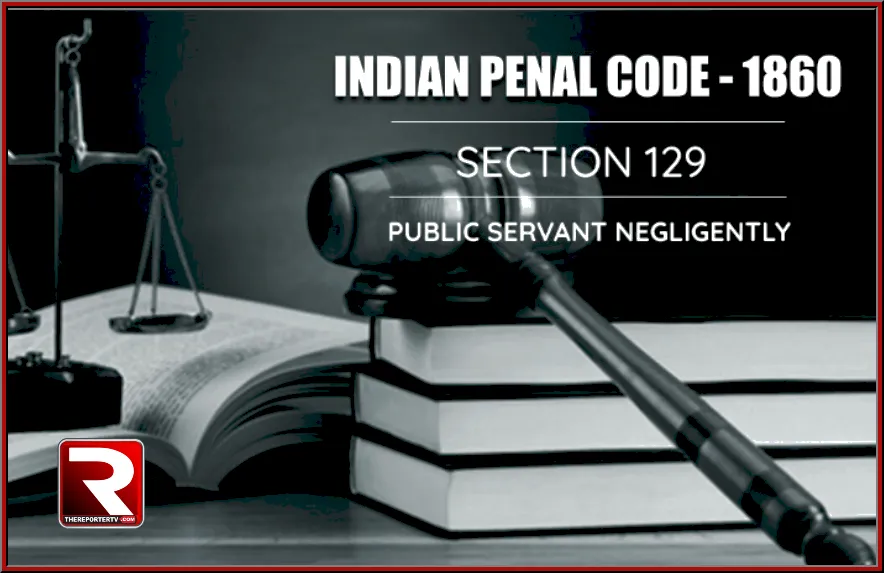Negligence may be a term meaning carelessness or a breach of an obligation. Negligence is employed generally language to mean someone was unreasonably lax in fulfilling some obligation.
Indian Penal Code, 1860 is the one of the most eminent charter of India. It has defined sections mentioning the punishments for several heinous and unlawful crimes. It applies to common man as well as public servants or government officials such as police etc. Negligence is one offence which cannot be easily done by any person, public servant or common people, it has to be taken very seriously. Courts in this matter rely on Section 129 of India Penal Code. Section 129 under which even police or public servants are held liable.
What is IPC 129?
Section 129 states that “ whoever, being a public servant and having the custody of any State prisoner or prisoner of war, negligently suffers such prisoner to escape from such place of confinement during which such prisoner is confined, shall be punished with simple imprisonment for a term which can reach three years, and shall even be susceptible to fine.”
This Section observes that when a state prisoner or prison of war is under the custody of a police man, and that prisoner has escaped from his cell or the place he is confined due to the negligence of that police man. Then, the police man will be held liable under Section 129 of IPC.
Is IPC 129 bailable?
Bail simply means the temporary release of an accused person awaiting trial, sometimes on condition that a sum of cash is lodged to ensure their appearance in court. This being a case of negligence is still considered a bailable offence. A bail can be granted for this offence.
What is the punishment for the IPC 129 Case?
Negligence on anyone’s part can cause unwanted danger to not only the people but also to the Nation’s security. Public servants performing this kind of negligence will be punished with 3 years of imprisonment or fine, or both as the decree passed by Court.
Is IPC 129 cognizable offence or non-cognizable offence?
Cognizable offence is defined as an offence where a police officer can arrest a person without a warrant. After the arrest has been made, the accused will be presented before the Magistrate within 24 hours. In this case, it is a cognizable offence as the police officer or public servant is negligent while performing his/her duty. Higher authorities can arrest the prescribed police officer or public servant without a warrant or decree of Court, as he/she was already negligent while executing their duty, which resulted in the escape of the prisoner.
How to file/defend your case for IPC 129 offence?
As stated above, Section 129 requires ‘public servant’s negligence to cause the escape of the prisoner’. This gives us a short list of preconditions which needs to take place for this situation to come in occurrence. These conditions are stated below :
The accused public servant should be a public servant during the time of offence.
Such a prisoner should be in the custody of the accused public servant.
The prisoner should have escaped from their specified confined place.
Such an escape should have happened due to the negligence of the accused public servant.
Is IPC 129 bailable or non-bailable offence?
As stated above, it is a bailable offence, that states that the accused can be set free before the trial on bail.
Judgments w.r.t. IPC Section 129:
Sri Mukut Dutta Vs. State of Assam, 2014
Brief facts of the case is that about 12.30 P.M. three prisoners of the Central Jail, Dibruarh were taken to AMCH, Dibrugarh for his or her treatment escorted by three constables. After their treatment, constable Dina Bora informed Nayak Atul Chetia that accused Mukut Dutta had fled faraway from his custody. The Superintendent of Central Jail Dibrugarh informed the matter to the Court of Dibrugarh. Later, accused Mukut Dutta was arrested and forwarded to judicial custody. Accused Dina Bora was allowed to travel on bail. On completion of investigation police submitted blotter u/s 224 IPC against accused Mukut Dutta and Section 120B, 109, 129 IPC against the accused constable 169 Dina Bora.
On appearance of the accused trial proceeded and on conclusion of trial the learned Chief Judicial Magistrate Dibrugarh. Convicted the accused /appellant Sri Mukut Bora u/s 224 IPC and sentenced him and acquitted the other accused Dina Bora on benefit of doubt.
Babu Ram S/O Kalu Ram vs State Of U.P. 2014
The facts borne out from the record and therefore the pleadings of the parties are that the petitioners at the relevant time were posted at Police Line, Saharanpur. They were assigned the duty of transporting a notorious under-trial accused, Rashid from District Jail, Saharanpur to Tis Hazari Court, Delhi on 27.4.2001. While returning at about 12.30, within the night of 28.4.2001, near Deoband, the said accused jumped out from the running train alongside handcuffs and cord at a place which was 10-15 k.m. from Deoband. The escape of the said accused from the custody of the petitioner isn’t disputed. In the reply submitted by the petitioners they admitted that the said accused escaped from their custody.
However, the circumstances during which he got escaped sought to be explained by them submitting that at about 12.30 p.m., he desired to attend his call of nature and both the petitioners while carrying him to the restroom within the train compartment, when reached near the door, he pushed Constable, Baburam who received constable, Subhash Chandra who was behind the previous and at that moment the accused ran away by jumping out from the compartment of the train. Since it was midnight and it was dark, they tried to shoot him but since nothing was visible outside the running train, they might not fire .
The train stopped at about 12.45 at Deoband railroad station where both petitioners got down and thereafter came back to the place where the said accused has escaped and tried to look him out for whole of the night but couldn’t find any clue and ultimately on subsequent date i.e. 29.4.2001 at about 1.30 p.m. lodged report at Police Station Deoband. The judgment of the case was the petitioners were punished for gross negligence on their parts.
Conclusion:
Nation’s safety and security is the foremost priority of the Government. This kind of negligence on anyone’s behalf can cause uninvited danger on borders and inside the nation. Section 129 makes the citizens believe that under the eyes of law each and every person is the same.


